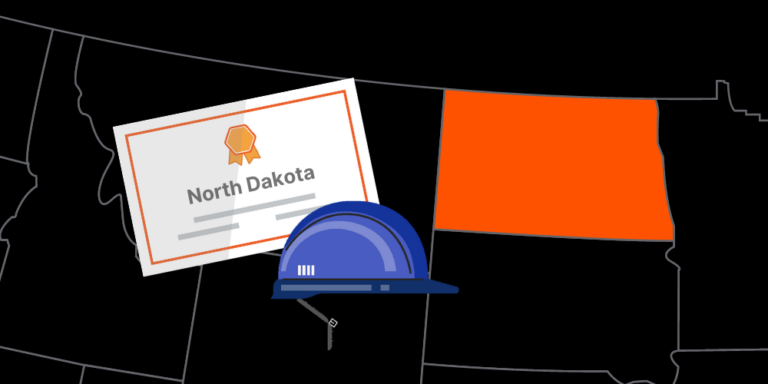

North Dakota legally requires any contractor working on jobs exceeding $4,000 to first obtain a license. Contractors include anyone performing construction, repair, alteration, or demolition work on roads or structures, including public, commercial, and private residential properties.
Fortunately, North Dakota’s contractor licensing requirements are straightforward and generally involve an application, certificate of insurance, workforce safety training, and a filing fee. We’ll lay out all of the requirements below so that you can get your North Dakota contractor’s license and start taking on jobs.
Table of contents
Essentially, anyone who is working in a construction-related field (regardless of trade or specialty, public or private projects) must obtain a contractor’s license in North Dakota — unless none of their individual contracts are worth more than $4,000.
There are just six steps to get a contractor’s license in North Dakota: choose a license, register your business, fill out an application, provide proof of insurance, present evidence of safety compliance, and pay a filing fee.
North Dakota offers four different contractor licenses — Class A, B, C, and D — that vary in the contract amount they allow for a single job.
Class A: Contracts over $500,000. Filing fee: $450. Class B: Contracts up to $500,000. Filing fee: $300. Class C: Contracts up to $300,000. Filing fee: $225. Class D: Contracts up to $100,000. Filing fee: $100.In addition to a general contractor’s license, there are also specific licenses required for electricians, plumbers, and asbestos contractors.
North Dakota requires that business entities (like sole proprietors, partnerships, and LLCs) register their business with the Secretary of State. Make sure you follow the state guidelines for business entity registration.
Use the North Dakota Online Services portal to register a business account and fill out the online contractor application. In addition to providing information about your business, you’ll also be required to provide a statement under oath testifying to your qualifications to work as a contractor.
Demonstrate that you carry insurance (including liability coverage) by providing a certificate that lists your business name.
Additionally, the certificate holder should be listed as follows:
North Dakota Secretary of State
600 E Blvd. Ave. Dept 108
Bismarck, ND 58505
A statement from Workforce Safety & Insurance (WSI) demonstrates that you are in good standing with respect to workforce safety and insurance requirements.
More information is available on the WSI website or by contacting WSI by phone at 701-328-3800.
Depending on the license you’ve chosen, you’ll need to pay the corresponding filing fee. North Dakota accepts payment from major credit cards or checks made payable to the North Dakota Secretary of State.
North Dakota considers unlicensed contracting a Class A Misdemeanor. This means working without a license could result in steep fines and even jail time.
While almost all contractors need to carry a license, the state doesn’t explicitly require licensing to file mechanics liens. This means that contractors who don’t carry licenses might be able to file a mechanics lien for unpaid work.
But, just because North Dakota doesn’t require a license to file a mechanics lien doesn’t mean you shouldn’t carry one. If you file a lien and the customer still doesn’t pay, you might have to foreclose upon the lien to get paid. Once you take the case in front of a foreclosure court, the court might not look so fondly upon your unlicensed status.